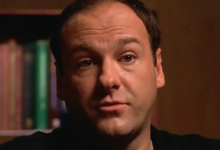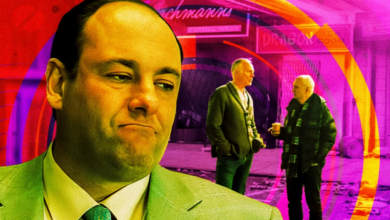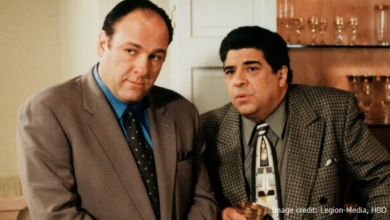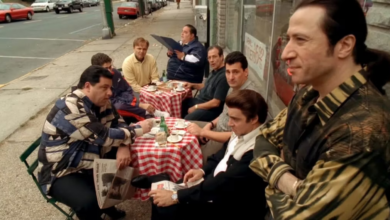‘The Sopranos’ Most Surprising Death Changed the Direction of the Show
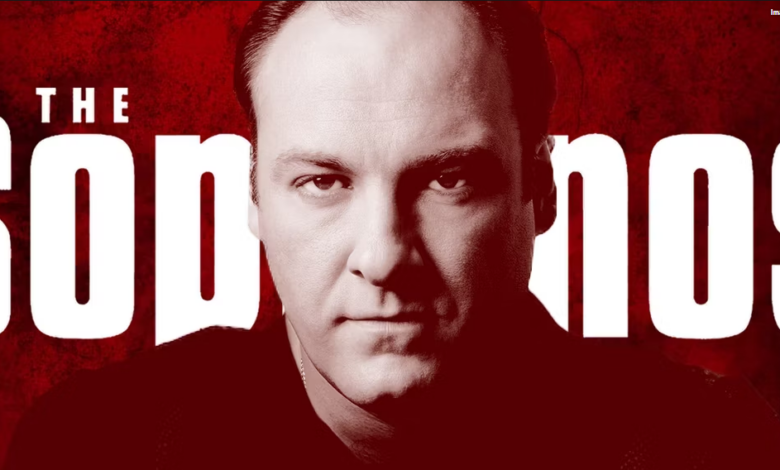
“In the midst of death, we are in life. Or is it the other way around?”
The iconic HBO series The Sopranos, which celebrates its 25th anniversary this year, came to be as a result of ABC-head Lloyd Braun giving creator David Chase an inspiring speech. After being offered the opportunity to make a TV show like The Godfather, Chase turned him down, wanting to avoid the clichés of overcoats and 1940s cars. But then, on his drive home, he remembered a feature film idea he once pitched that might bring a personal and interesting quality to Braun’s idea. In short, a mother character in the same vein as Chase’s own. “My mother was an eccentric, very morbid person, so I found myself in therapy,” Chase told Charlie Rose. And so, before any other detail of the series, Livia Soprano (Nancy Marchand) was created.
“My mother was sort of the model for Livia Soprano,” Chase told 60 Minutes. “She was threatening to poke my eye with a fork, but she was hysterical.” Following advice from his wife, Chase decided to write a character based on his own mother. “I got this idea of [pairing Livia] with a gangster. Because to see a tough guy like that having to contend with a tough woman like that might be interesting.” This idea was coupled with Braun’s suggestion of a gangster TV series, which Chase ultimately outlined as, “a mobster who goes to therapy because his mother’s driving him crazy, and the therapist helps him to realize that his mother is his enemy.” This link between Tony Soprano (James Gandolfini) and his mother was essentially what The Sopranos would center on, earning the tagline, “If one family doesn’t kill him, the other family will.”
David Chase Wanted To Explore Tony and Livia’s Relationship
Season 1 of The Sopranos introduces us to Tony as he becomes acting boss of the New Jersey mob, a promotion which offends his Uncle Junior (Dominic Chianese). Meanwhile, Tony places his mother in a lavish “retirement community” (not to be confused with a nursing home!). As outlined in Chase’s original pitch, Tony soon comes to terms with the reality that his mother along with his uncle have become his primary antagonist, hiding in plain sight among all of Tony’s other mob-related enemies. The two attempt to have Tony killed, but fail, and the characters all live to allow their conflict to unfurl over the coming seasons. This first season stands as a prime example of a premise-establishing story with room for series-long development, and David Chase knew exactly what that plan was.
After a second season in which the two refuse to speak to one another, Tony gifts stolen plane tickets to his mother. This misstep helps the FBI become closer to catching Tony than ever. Chase revealed on the Talking Sopranos podcast that “there was a plan” for Livia’s character in Season 3 that they never got to follow.
“My plan was — in fact, it was starting [to happen already] — it had something to do with airline tickets that Tony had given her to go to Florida. They were, of course, stolen, and she got busted with those tickets, and so she was going to testify against him in court. They were going to get him on a RICO and his mother was going to testify against him. And that was going to keep that horrible relationship going.”
Unfortunately, however, this was not the version of the story we got.
‘The Sopranos’ Used CGI for Nancy Marchand After She Died in Season 2
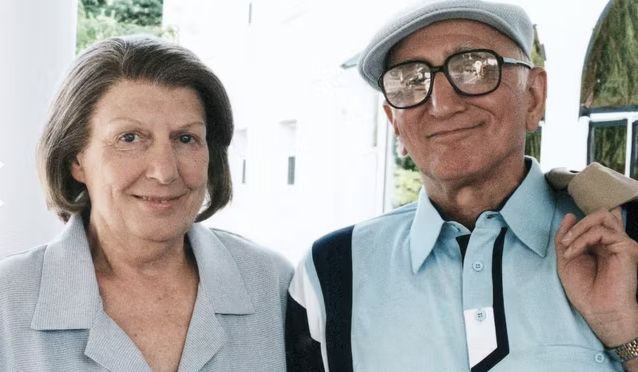
Two months after Season 2 ended its broadcast run on television, actress Nancy Marchand died in June 2000, one day before her 72nd birthday. A silver lining to this unfortunate dark cloud was that the timing allowed for the writers to reconfigure the third season around her inevitable absence. To give the series the illusion of complete narrative control, Livia appears for one final scene before her off-screen death and ensuing funeral. To remind the audience that she “was rather unloving toward [Tony] was crucial,” Chase said. “I thought that was needed to have that on the table in that story.” He added, “Since we see Livia really not say to him, ‘Honey, I’ll lie [to the FBI] for you because I’m your mother,’ we see Livia continue to think about herself. I felt it was necessary to platform the rest of the story.”
Although these simple setups would go on to ensure that her presence was felt in Tony’s story moving forward, it was obviously too late to shoot the new scene with Marchand, so VFX was implemented in bringing the actress back to life for one final scene. “Livia’s repertoire of comments was usually the same,” Chase explained. “‘Outta sight, outta mind,’ ‘What do you care?’ ‘I wish the Lord would take me.’ She said these things all the time. So we built a scene using those responses” from outtakes and clips from previous seasons. The limited footage meant the scene fell victim to continuity issues with her hair, as well as a clear disassociation between her head and body, but considering the pre-established bizarre dream sequences on The Sopranos, it gets away with its eerie feeling more than other shows might.
The reality is that Livia played such a large part in Tony’s life and development, it was fundamental to his character for him to have a final scene with her. Throughout the rest of the series, Livia’s presence is felt in everything that Tony does. It especially affects his relationships with the women in his life.
Tony Soprano’s Relationships With Women Are All About His Mother

Tony confesses to his therapist Dr. Melfi (Lorraine Bracco) that the news of his mother’s death came as a relief to him, somewhat due to her involvement with the FBI. This proved to audiences that his complex relationship with his mother would not end with her death. Although Marchand’s death meant the series could no longer center on Tony’s relationship with his mother in the literal sense, the writers ensured that Livia’s presence was felt regardless, most notably in Tony’s Freudian relationships with women who emulate his mother in various ways. Firstly, of course, there’s Dr Melfi, whose job requires her to discuss Livia’s influence on Tony, and even briefly appeared as Nancy Marchand in a dream sequence. Then there are Tony’s various mistresses (or “Goomahs”) who often remind him of his mother.
Earlier in the show, Tony engaged in a tryst with Annalisa Zucca (Sofia Milos) who, much like Livia, was controlling the mob from behind the scenes. Soon after Livia’s death, Season 3 focuses on Tony’s relationship with Gloria Trillo (Annabella Sciorra) whose psychotic tendencies lead him to admit, “I didn’t just meet you. I’ve known you all my life”. Perhaps most surprisingly, Tony also engages in an affair with Svetlana Kirilenko (Alla Kliouka Schaffer) who worked as his mother’s caretaker in the lead-up to her death. And finally, of course, there’s his wife Carmela (Edie Falco), who despite her hatred of Livia, bears a striking resemblance to Tony’s mother. In the prequel movie The Many Saints of Newark, Livia was played by Vera Farmiga who wore a prosthetic nose, not only to look like Nancy Marchand, but also so that “her profile was kind of like Edie [Falco]’s.” Chase explained on Marc Maron’s WTF podcast, “So you can say, ‘Of course, he married his mother!'”
